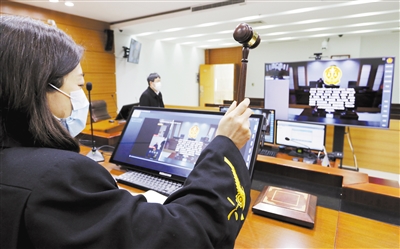
 |
| A judge at Suzhou Intermediate People's Court decides on a case via video link and live broadcast. (PHOTO: VCG) |
The report to the 20th CPC National Congress has stressed the need to exercise law-based governance on all fronts and advance the rule of law in China.
As early as January 2021, China officially issued its plan (2020-2025) on building a law-based country, which puts forward the concept of "smart rule of law" for the first time.
The plan makes it clear that modern scientific and technological means, such as big data, cloud computing and AI, should be fully utilized to build a law-based country in a digital, networked and smart way.
With numerous practices, information technology has prompted profound changes in achieving a smart, law-based national governance system.
Smart legal service system
The people's court mediation platform has been established to support a new pattern of online dispute resolution.
By September 2022, people's courts at four levels across the country, as well as more than 90,000 mediation organizations and 350,000 mediators had joined the platform to provide online dispute resolution services for public, which greatly helps improve the efficiency of handling disputes.
What's more, the courts also provide 24-hour online litigation services. Since the outbreak of the COVID-19 pandemic, online litigation in people's courts has risen, with more than 11 million cases filed online in 2021 nationwide.
Smart trial system
New technologies including big data, AI and blockchain have been used in judicial work to help judges find facts and apply the law.
The whole process of online case handling based on electronic files was implemented. Since 2016, the Supreme People's Court has guided courts at all levels to create electronic files, so that judges can conduct examinations and deliberations of cases based on the electronic files throughout the trial process.
In addition, various intelligent trial assistance systems were developed to greatly reduce the routine work of judges. Relying on advanced AI technology, they provide intelligent case-handling tools such as automatic case information filling, legal knowledge service, and automatic transcription of trial recordings.
All these help reduce the routine work of judges by more than 30 percent and improve the trial efficiency by more than 20 percent.
Judicial big data application
The people's courts have made use of information technology to build a big data management and service platform, and used judicial big data to improve judicial administration and serve economic and social governance.
Four platforms have been established to publicize trial procedures, trial activities, judgment documents, and execution information respectively, facilitating the disclosure of case information in accordance with the law and building of an open, dynamic, transparent and convenient judicial mechanism.
By September 2022, more than 20 million trials had been broadcast live on the website, with in excess of 50 billion visits. Meanwhile, more than 130 million judicial documents had been released and been accessed more than 90 billion times.


 Next
Next




